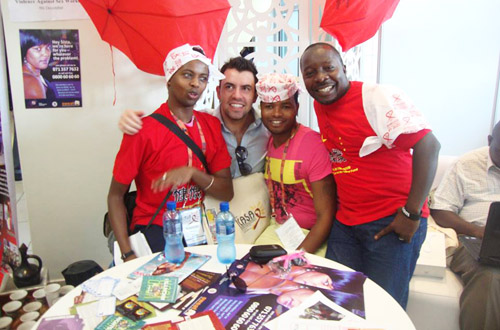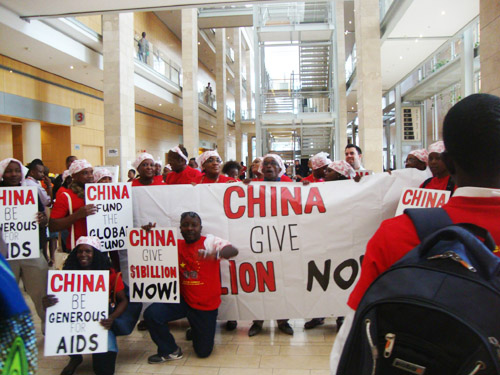Posted by Ben Clapham on January 8, 2014

amfAR’s Ben Clapham (second from left) and GMT advocates promote sex workers’ rights at ICASA.
I recently spent a week in Cape Town, South Africa, with HIV activists and community workers from across Africa at the International Conference on AIDS and STIs in Africa (ICASA). This conference saw a vast improvement in LBGTI activists’ ability to be seen and heard over the last ICASA, which took place in Addis Ababa, Ethiopia, in 2011. Addis Ababa proved to be a difficult and even dangerous place for LGBTI HIV activists to organize due to the conservative sociopolitical context in Ethiopia, where same-sex sexual conduct is illegal. The MSM pre-conference had to be moved to a secure UN building after protesters threatened to burn down the hotel where it was originally scheduled to take place. This year’s MSM pre-conference was flawlessly executed thanks to the more favorable sociopolitical context in South Africa, where discrimination based on sexual orientation is illegal and same-sex marriage is legal.

Protestors at ICASA demand that China contribute more to the Global Fund to Fight AIDS, Tuberculosis and Malaria.
While attending the conference, I had the opportunity to meet with many trans sex workers and trans activists who explained that they felt that their voices were really being heard. A few trans activists presented oral presentations about the trans community’s HIV needs. Increasing visibility for trans activists is important anywhere in the world. However, in Africa there is little understanding of trans individuals and even less motivation or will to provide them with competent, stigma-free health services, making it especially essential that they can speak up about their needs and rights at ICASA.
Beyoncé, a trans activist from Uganda, said that ICASA this year was “very important for trans people to be heard, for our needs to be voiced, and for government and regional decision makers to better understand our community.” However, many activists stated that the number of posters and presentations submitted and accepted by LBGTI people was still lower than expected, even though they seemed to be more accepted in Cape Town than in Ethiopia. But the overall feeling at ICASA was definitely more positive and open. The opening ceremony even featured a trans singer from Angola—a clear sign that GMT issues are increasingly more visible in Africa.
The location of ICASA is an important factor in the ability of LGBTI HIV activists and community workers to organize, advocate, and protest. However, the next ICASA is currently slated to take place in Tunis, Tunisia, which, like Ethiopia, outlaws same-sex sexual activity, and where security concerns could again impede the GMT community’s visibility.